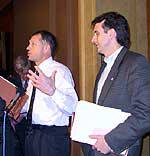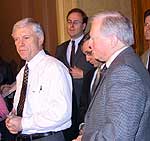'Not a dollar of common ground' as budget talks open
By Laura McCallum
Minnesota Public Radio
March 27, 2002
|
| RealAudio |
On the day that legislators once hoped to finish their work for the year, House and Senate leaders emerged from budget talks to report little progress. Legislative leaders say they're far apart on major issues, and the session will likely last at least another couple of weeks.
| |
|
|
|
||
After meeting behind closed doors for two hours, House and Senate leaders say they agreed on the framework for resolving the major issues left in the session. Five working groups on the budget, taxes, transportation, bonding and anti-terrorism measures will begin meeting informally this week, and hold public meetings starting on Monday.
"There's not one dollar of common ground in the bills that passed the House and which will ultimately pass the Senate this afternoon, and so everything is a sticking point at this time," said Republican House Speaker Steve Sviggum of Kenyon.
Sviggum says House Republicans oppose raising taxes to balance the budget, although he says a gas tax increase is possible, since the money is earmarked for transportation projects.
The Legislature must still plug a $439 million projected hole in the state budget. The Senate budget plan raises the cigarette tax by 60-cents a pack, and the Senate transportation package boosts the gas tax by 6-cents a gallon.
DFL Senate Majority Leader Roger Moe of Erskine says the House balances the budget by cutting programs that help low-income and vulnerable Minnesotans. He says the House also failed to approve any new money for transportation.
"They have a transportation package that actually loses money," Moe said. "It ends up with less money in the Department of Transportation for projects as you go down the road. That is not responding to the public's need for investments in our transportation and transit system, so they have some major problems, but again, we'll work with them, hopefully they'll see the light in relatively short order and we can get this over with."
| |
|
|
|
||
Another leader who participated in the so-called "summit" wasn't as optimistic.
"I could see this going on awhile," said Republican Senate Minority Leader Dick Day of Owatonna, who says no new ideas emerged at the meeting. He says he wouldn't be surprised if the session goes until May.
"It's kind of sad. I think there's governor politics involved, with Pawlenty and Moe, and I don't think that sets well; I think we could be here quite awhile," Day said.
Moe and Republican Majority Leader Tim Pawlenty of Eagan are both running for governor. The current governor was not invited to participate in the budget talks.
Moe says Governor Ventura hasn't really been a player in the budget process.
"Maybe we'll have to have a contest for sightings of him; I don't know where he's at," said Moe
"It is politically convenient for the Legislature to say that the governor is missing in action," countered Ventura spokesman John Wodele, who says the governor submitted a plan in January that would balance the budget over the next four years.
"The governor is not missing in action. His plan is the best plan, it is the right plan, thinking people know it's the right plan, they are in avoidance of the governor and his plan," he said.
Ventura's plan used a combination of tax increases, spending cuts and budget reserves to balance the budget.
Lawmakers rejected the plan, and passed a bill that used one-time money and spending cuts to address most of the deficit in the current biennium. Ventura vetoed the bill, but the Legislature overrode his veto. Legislative leaders say they'll take a similar approach to the major issues left in the session. They'll try to pass bills with enough votes to override any veto by Ventura.
More from MPR

